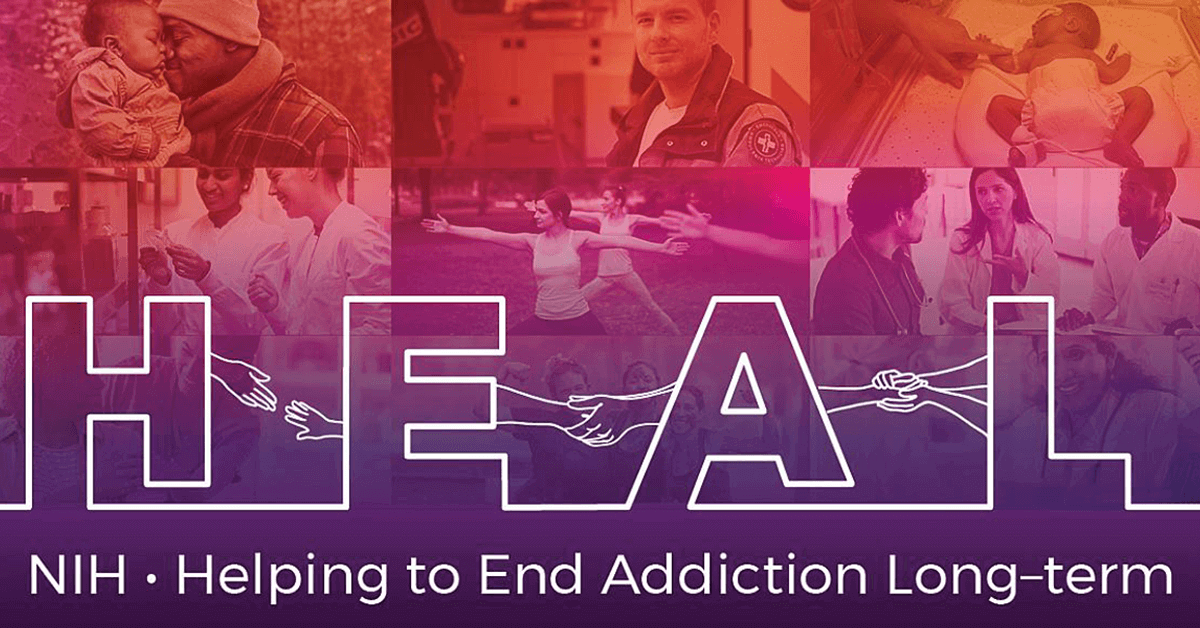The Helping to End Addiction Long-term® Initiative, or NIH HEAL Initiative®, approaches the opioid crisis from two major angles: enhancing pain management and addressing opioid misuse and addiction. From mindfulness meditation to aid in recovery from addiction to studies to understand a person’s individual response to pain, researchers in hundreds of funded projects across the country are exploring diverse paths to reach these goals and overcome obstacles.
“Stigma is a major obstacle to our efforts to help end the opioid crisis,” said Rebecca G. Baker, Ph.D., director of the NIH HEAL Initiative. “We not only recognize the barriers stigma creates for people with pain and addiction but are working intentionally to address stigma through HEAL research.”
That’s why the NIH HEAL Initiative’s inaugural Investigator Meeting in January dedicated a plenary panel to a conversation about stigma, which was a recurrent theme in discussions of research across the initiative.
The Surgeon General of the United States, VADM Jerome Adams, M.D., M.P.H., headlined the panel, after his keynote address on stigma.
Starting a conversation about stigma
It can’t be easy to tell a roomful of strangers about your little brother’s struggle with addiction. But that’s exactly what the Surgeon General of the United States did at the HEAL Investigator Meeting.
“I’m often asked, as Surgeon General, what I think the biggest killer is out there, whether it’s cigarettes or obesity or fentanyl,” said Adams. “I feel the biggest killer out there is actually stigma.”
Adams’ brother Phillip had anxiety and depression at a young age. He started using alcohol, then marijuana. One day, someone gave him a pill at a party. That soon led Phillip to heroin, and eventually he started committing crimes to support his addiction. Now he is incarcerated.
Adams believes Phillip self-medicated his anxiety and depression with drugs and alcohol — and that stigma made his mental health and addiction worse.
“We know that there is a stigma attached to acknowledging that you have mental health issues,” Adams said, adding that drug addiction is often seen as a moral failing, too. “If we’d looked at it as a disease, perhaps my brother would have been given help sooner, before his addiction worsened and before he got involved in the criminal justice system.”
Stigma prevents better pain management and addiction treatment
Several meeting attendees noted that pain, pain treatment, and addiction are strongly linked with stigma.
“For people with persistent pain, a lot of times they feel like they should just be able to do better,” said Lynn DeBar, Ph.D., M.P.H., a clinical psychologist and behavioral health researcher at Kaiser Permanente Washington Health Research Institute in Seattle. “A lot of times, what people feel they’re being told is, ‘This is something that is all in my head — that I should be able to just be stronger willed.’”
Meanwhile, doctors are frustrated, both because pain can be very difficult to treat and because there is no objective way to measure it. Doctors may doubt a patient with pain and refuse to prescribe medication. Pharmacists may suspect someone with an opioid prescription of misusing drugs and decide not to fill the prescription. Stigma can therefore prevent treatment and may even push people with chronic pain to seek out illegal drugs.
For people with opioid use disorder, internalized stigma can prevent them from sticking with treatment and even set them on a path to relapse, overdose, and death.
“Imagine telling your mom that you’re on methadone,” said Valerie Earnshaw, Ph.D., a social psychologist at the University of Delaware, Newark. “And your mom tells you, ‘Well, it’s great that you’re in recovery, but aren’t you just substituting one drug for another?’”
Researching and addressing stigma
Earnshaw researches how stigma undermines health. She used to study stigma associated with HIV and was thrilled to hear so many conversations about stigma at the HEAL Investigator Meeting.
“In HIV, it took a long time before researchers were engaged in conversations around stigma,” said Earnshaw. “Now, from Day 1, people are talking about it, and they’re looking for solutions, and they’re trying to figure out what to do about it. I think it’s really promising. With people talking about stigma from the beginning, we have the potential to make a lot of progress in addressing it together.”
The NIH HEAL Initiative funds several studies that touch on the stigma associated with medications to treat opioid use disorder. These studies are part of the NIH HEAL Initiative’s effort to use research to address barriers to treatment for people with opioid use disorder.
For example, a HEAL-funded study at the University of California, Los Angeles, is testing whether an online peer-led support community can encourage people to stay on medication treatment for opioid use disorder. The online community is a place where people can share their firsthand experiences with stigma, taking medications for opioid use disorder, and recovery. Researchers hope this will reduce the stigma associated with medication treatment for opioid use disorder.
At the end of the day, one of the best ways to decrease stigma is to tell stories, said Adams. That’s why he tells his brother’s story so often.
“It’s a painful story to tell,” Adams said. “I do it because if addiction can happen to the family of the Surgeon General of the United States, it can happen to anyone.”

NIH HEAL Initiative Research Focus Areas
The NIH HEAL Initiative is organized into six research focus areas. Within those focus areas, 12 NIH Institutes and Centers are leading 25 research programs to find scientific solutions to the opioid crisis. Learn more about the initiative's research areas.

Words Matter — Terms to Use and Avoid When Talking About Addiction
National Institute of Drug Abuse
This page offers background information and tips for providers to keep in mind while using person-first language, as well as terms to avoid to reduce stigma and negative bias when discussing addiction.

Addiction Is a Complex Brain Disease, Says Volkow
NIH Record
Advances in medical imaging have revealed that addiction is a complex disease of the brain, said NIDA director Dr. Nora Volkow.
 U.S. Department of Health & Human Services
U.S. Department of Health & Human Services
